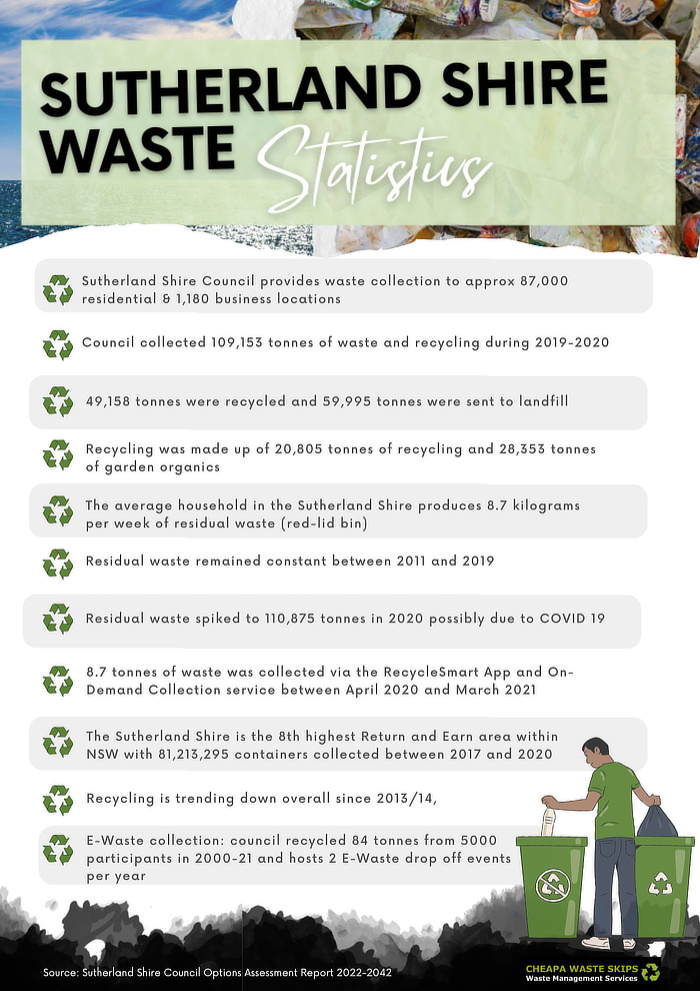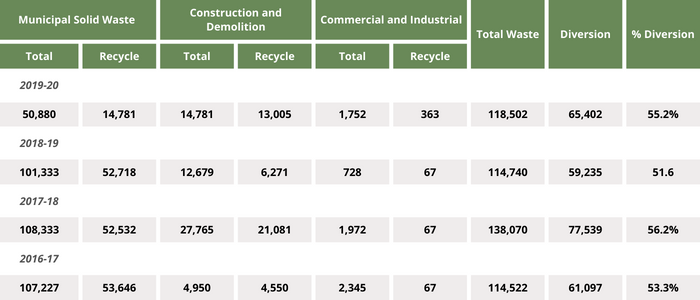The Sutherland Shire had approx 230,903 residents in 2021, and the population is expected to grow to 266,020 by 2036 which puts more pressure on the council and its residents to manage waste more effectively. The Council LGA is primarily residential but also has commercial, industrial and rural areas.
We explored data on waste management for the Sutherland Shire to understand how much waste is produced and how it is managed.
In this statistics post, we’ll cover:
- How Much Waste Is Produced In The Sutherland Shire?
- Sutherland Shire Waste – Quick Stats
- Total Waste In The Sutherland Shire 2016-2020
- What Types Of Waste Came From Red Bins In The Sutherland Shire?
- What Types Of Waste Came From Green Bins?
- What Types Of Waste Came From Yellow Bins?
- What Are The Sutherland Shire Council’s Waste Goals?
- Waste Education and Community Engagement Stats
- Waste Management Facilities Quick Stats
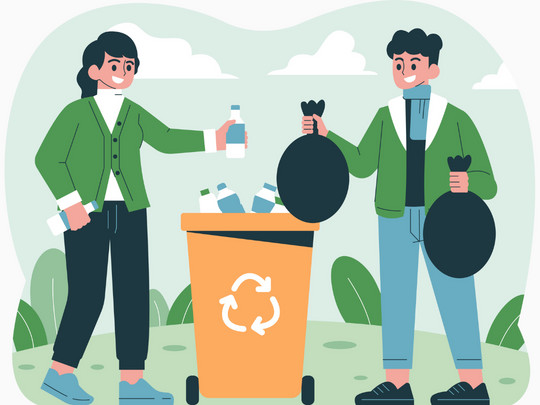
Total waste produced in the Sutherland Shire during 2019-2020 was 118,502 tonnes with 65,402 tonnes diverted from landfill.
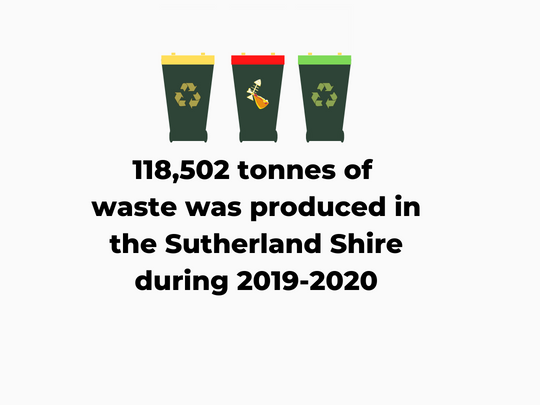
Sutherland Shire Waste - Quick Stats
- Sutherland Shire Council provides waste collection to approx 87,000 residential properties and 1,180 business customers
- Council collected 109,153 tonnes of waste and recycling during 2019-2020
- 49,158 tonnes were recycled and 59,995 tonnes were sent to landfill
- The portion that was recycled was made up of a) 20,805 tonnes of recycling and b) 28,353 tonnes of garden organics
- The average household in the Sutherland Shire produces 8.7 kilograms per week of residual waste (red-lid bin)
- Residual waste remained constant between 2011 and 2019
- Residual waste spiked to 110,875 tonnes in 2020 possibly due to COVID 19
- Recycling is trending down overall since 2013/14, the introduction of Return to Earn (post 2017/18) may be a contributor
- The Sutherland Shire is the 8th highest Return and Earn area within NSW with 81,213,295 containers collected between 2017 and 2020
- 8.7 tonnes of waste was collected via the RecycleSmart App and On-Demand Collection service between April 2020 and March 2021
- E-Waste collection: council recycled 84 tonnes from 5000 participants in 2000-21 and hosts 2 E-Waste drop off events per year
2019-2020
- Total waste produced in the Sutherland Shire during 2019-2020 was 118,502 tonnes with 65,402 tonnes diverted from landfill
- Total Municipal Solid Waste over 2019-2020 was 101,969 tonnes, with 50,880 tonnes recycled
- Total waste from Construction and Demolition was 14,781 tonnes, with 13,005 tonnes recycled
- Total waste from Commercial and Industrial was 1,752 tonnes, with 363 tonnes recycled
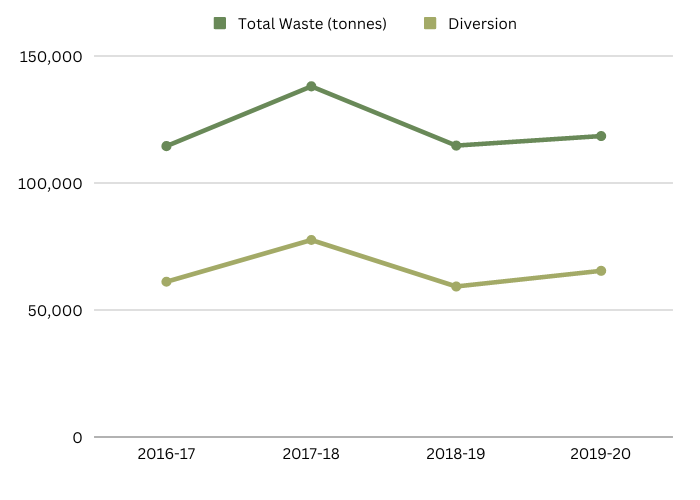
2018-2019
- Total waste produced in the Sutherland Shire during 2018-19 was 114,740 tonnes, with 59,235 tonnes diverted
- Total Municipal Solid Waste over 2018-19 was 101,333 tonnes, with 52,718 tonnes recycled
- Total waste from Construction and Demolition was 12,679 tonnes, with 6,271 tonnes recycled
- Total waste from Commercial and Industrial was 728 tonnes, with 67 tonnes recycled
2017-2018
- Total waste produced in the Sutherland Shire during 2017-18 was 138,070 tonnes, with 77,539 tonnes diverted
- Total Municipal Solid Waste was 108,333 tonnes, with 52,532 tonnes recycled
- Total waste from Construction and Demolition was 27,765 tonnes, with 21,081 tonnes recycled
- Total waste from Commercial and Industrial was 1,972 tonnes, with 67 tonnes recycled
2016-2017
- Total waste produced in the Sutherland Shire during 2016-17 was 114,522 tonnes, with 61,097 tonnes diverted
- Total Municipal Solid Waste was 107,227 tonnes, with 53,646 tonnes recycled
- Total waste from Construction and Demolition was 4,950 tonnes, with 4,550 tonnes recycled
- Total waste from Commercial and Industrial was 2,345 tonnes, with 67 tonnes recycled
What Types Of Waste Came From Red Bins In The Sutherland Shire?
In 2019 there was a kerbside audit of waste and they found that waste comprised of:
- Loose food, 34.5%
- Other, 11.8%
- Non-recyclable paper, 9.2%
- Nappies, 8.7%
- Soft plastics, 7.6%
- Recyclable containers, 6.7%
- Containerised food/liquid, 6.0%
- Pet litter, 3.7%
- Textile/carpet, 3.6%
- Recyclable paper, 3.0%
- Vegetation, 2.6%
- Wood/Timber, 1.7%
- E waste, 0.7%
- Hazardous, 0.2%
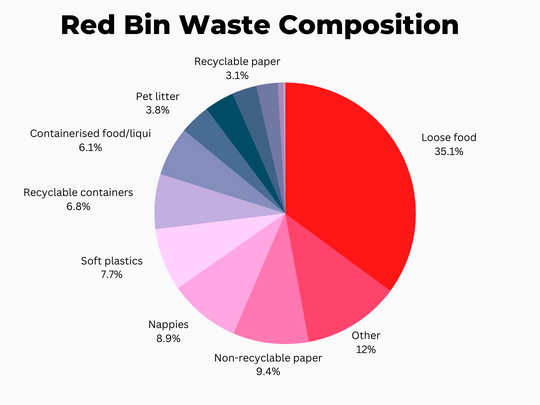
What Types Of Waste Came From Green Bins?
The following composition of waste came from the kerbside garden organics bins in 2019:
- Vegetation, 98.6%
- Ceramics, dust,dirt, rock, inert, 1.0%
- Wood/timber, 0.1%
- Other, 0.2%
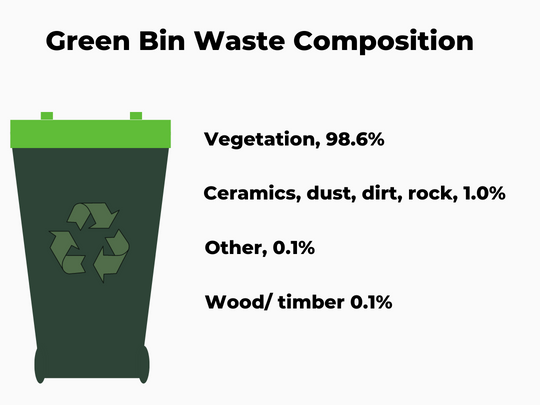
What Types Of Waste Came From Yellow Bins In The Sutherland Shire?
What Did Sutherland Shire Residents Put In Their Recycling Bins? 2020-2021
From a 2020-2021 waste audit, the following material was identified in recycling:
- Paper/Cardboard, 47.90%
- Glass, 28.40%
- Plastic, 9.10%
- Contamination, 10.10%
- Steel, 3.96%
- Aluminium, 0.52%
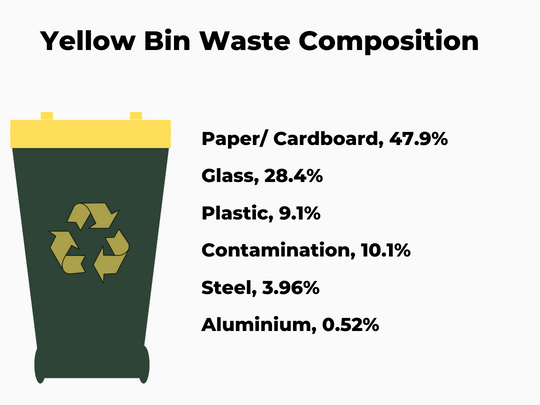
What Are The Sutherland Shire Council’s Waste Goals?
- 80% diversion of waste from landfill 2030;
- 50% reduction in organic waste sent to landfill by 2030;
- Net zero emissions from organic waste by 2030;
- Less than 1% contamination of green organics;
- Less than 6% of contamination in recycling bins;
- Maximise resource recovery of 75% for internal Council-generated waste; and
- 50% reduction of hazardous waste in general / residual type waste by 2030
- Reduce construction based emissions by 20%
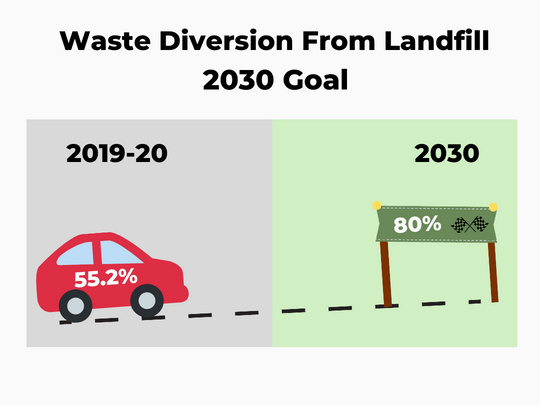
Waste Education and Community Engagement Stats
Stats on waste education initiatives during 2019-20:
Waste Wise Workshops
19 Waste Wise workshops took place with 361 residents engaged, covering the following:
- Worm farm and composting
- Balcony and small space productive gardening
- DIY natural cleaning products
- Plastic free living & beeswax uses
- Reusable shopping bags making
- Food preserving and Pickling
- Chook keeping
- Productive organic gardens
- Bokashi
- Recycled Fashion Tour
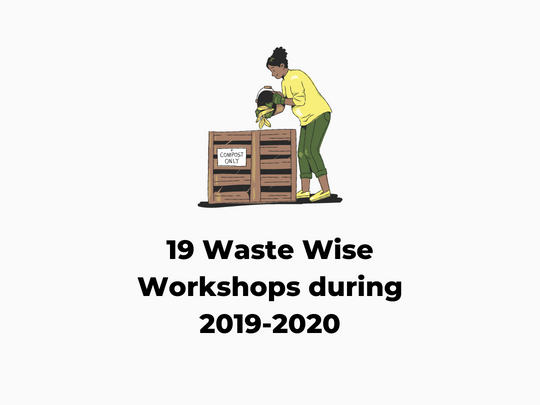
Monthly Compost and Work Farm Workshops
- 7 workshops, 136 residents
- Free compost bin or worm farm per participant
Compost Revolution
- 263 residents engaged
- 4,191 kg waste diverted
Waste Management Facilities Quick Stats
Here are some quick stats on waste management facilities that are used by residents and businesses in the Sutherland Shire.
- Lucas Heights Organics facility has a capacity of 80,000 tonnes of organic waste per annum
- Lucas Heights has 3 bioenergy power stations with 21.5 MW combined capacity which uses landfill methane gas
- Sutherland shire council has an exclusive reserved capacity of 50,000 tonnes waste per year at the Lucas Heights waste facility
- There are plans for a new resource recovery facility by Breen Resources in Kurnell which will process up to 600,000 tonnes of construction and demolition waste and approx 50,000 tonnes of commercial and industrial waste and non-residual organic waste per year
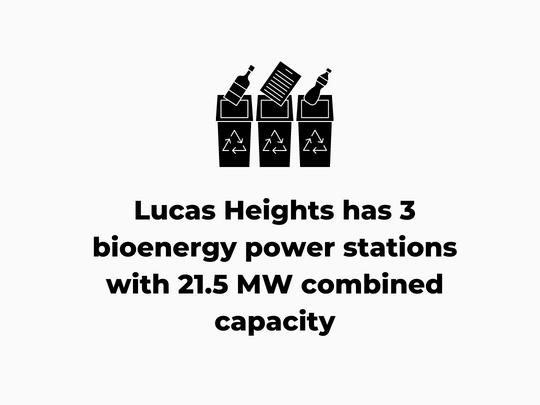
That’s it for our Sutherland Shire waste statistics, credit to the Sutherland Shire Council and talis consultants for the data provided in the Options Assessment Report Waste strategy 2022-2042.

